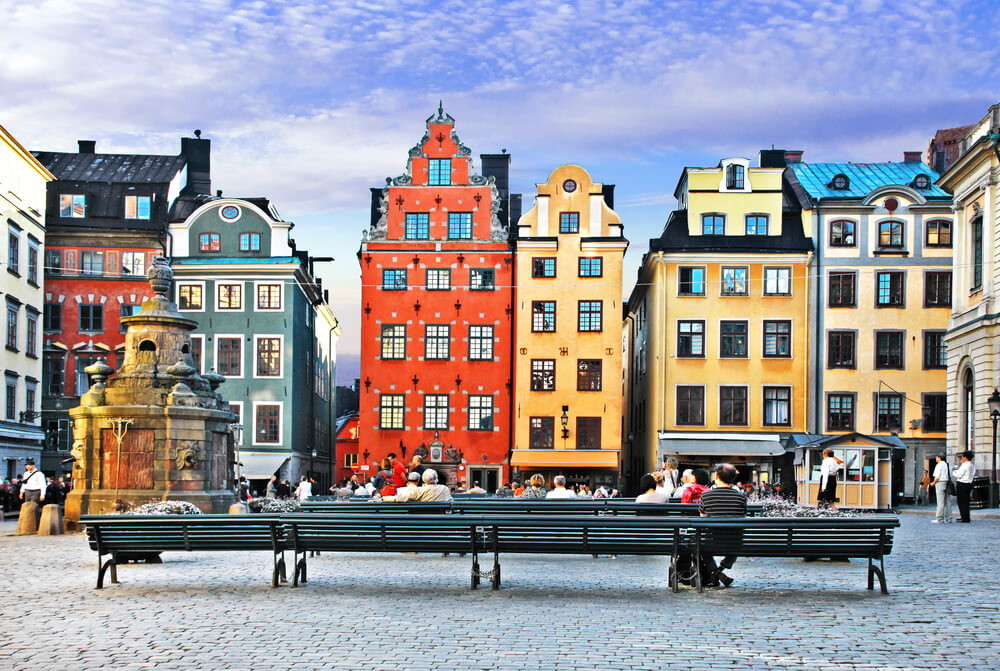Why Swedes continue to lead a habitual life while the whole world is quarantined
'16.04.2020'
Source: RBC Style
While most countries in the world have imposed severe restrictions on the fight against COVID-19, Sweden does not close its borders with the EU, keeps schools, kindergartens and even bars open. What drives the government of the northern country and what could be the consequences? Reasoning columnist "RBK Style".

Sweden's exceptional position leaves few indifferent. She is either admired or sharply criticized: The Gardian, following the mathematician Markus Karlsson, who calculated the risks of spreading the virus in the country, calls Sweden’s strategy “Russian roulette”, while Bloomberg more balancedly notes that “Sweden has the right to resist counterproductive and excessive measures observed in other European countries. "
Did the Swedes really "relax"? Nordea lead analyst Thorbjörn Isaksson called Sweden’s “wait and see” strategy. In other words, the government of the country refuses to take any drastic measures until there is no real need for them.
The fact that concerts and parties of up to 29 people were held in Sweden before March 500 (such a restriction was introduced at the time when other European countries were in strict quarantine) could create the feeling that the authorities had little difficulty fighting the spread of the virus. Deutsche Welle told how the hype was observed against the background of mass self-isolation in neighboring Denmark and Norway at the two largest ski resorts in Sweden - Are and Salen. So, in the tiny Are (population of 2800 people) over the weekend of March 21–22, more than 30 thousand guests visited. Most of them were not limited to skiing, but also attended après-ski parties for 499 people. Today this region is the second (after Stockholm) by the number of cases of COVID-19.
And even the current restriction on meetings of more than 50 people is perplexing, especially when you look at photos of large companies at a business lunch or at parties in bars: guys, do you really meet and eat at the same table during a pandemic?
This attitude towards the virus is dictated by several attitudes.
In Sweden, it is common practice to take responsibility for the risk of infecting colleagues or friends. This is supported both by society (at work, in response to coughing, they can make a remark and advise them to go home), as well as by the state (the first seven days of a paid sick leave can be taken without a visit to the doctor). Therefore, if the state issued an installation to stay at home with the slightest symptoms of acute respiratory viral infections, an ordinary Swede believes that everyone is doing this, and the risk of infection is low.
The Swedes have an almost religious attitude towards statistics. Many global and personal decisions in the country are made on the basis of big data. If it is known that a large number of accidents involving wildlife occur at dawn and sunset, then in areas marked with a special sign, the Swedes will be especially careful at this time. When it is clear that the risk of complications from a disease is higher than the risk of the consequences of vaccinations, the vast majority will be vaccinated. And if statistics say that the risk of dying from coronavirus at the age of 10–39 is 0,4% and most healthy people (and the Swedes as a whole are a healthy nation) will be asymptomatic, young people are confident that everything will be with them OK.
The high level of Swedes confidence in the authorities is also important. After the speech of Prime Minister Stephen Leuven, during which he said that the fight against coronavirus is everyone's personal responsibility, his rating increased by 21%. And if the government says there is no need for more stringent measures, most tend to believe it. And really take responsibility.
On the subject: 'Most acquaintances are dismissed without explanation': how our people survive without work in the USA
Sweden is often cited as an example for the successful implementation of the socialist model, but the degree of personal responsibility and civic initiative is high. The Swedes are ready to mobilize and make independent decisions both at the regional level and in private life. Yes, most kindergartens and schools are still open, but at the same time each commune has the right to decide on the complete or partial closure of the structures subject to it. Yes, there is no quarantine, most offices and industries continue to work, while most of the managers (of those who had this opportunity) decided on a remote work format.
In the spring of 2018 (presumably against the backdrop of the aggravation of Russian-Swedish relations), a brochure “Important information for residents of Sweden. If a crisis or war ensues. ” It told on behalf of the government how each resident of Sweden can independently prepare for an emergency, where to escape during an air strike, how to warm up without heating and how to use the toilet with a broken sewer. According to the plan for a crisis or war, the civilian population should hold out on their own for three days, after which help from the state will come. Some of the tips in this brochure, in particular on food purchases, are used by Swedes during a pandemic.
Many Swedes went through scout training as a child, go camping, hunt and have firearms at home (for this you need a license that is issued based on the results of complex exams, including knowledge of wildlife), so they are used to testing themselves, and they are familiar with rules of survival to extreme circumstances.
Shifting most of the responsibility for spreading the virus to citizens, the government also takes care of the maximum level of public awareness (even that part of it that does not speak Swedish). To the extent that at the beginning of the epidemic in the lower grades, schools showed a documentary about coronavirus. Parents were spared the need to explain to the children why now they have to constantly wash their hands and refrain from visiting their grandparents, and among the seven-year-old games about Pokémon and ponies that survive in the event of a water pipe infection have survived due to thawed snow.
The civic initiative is also manifested in the fact that local Facebook groups collect money to purchase protective equipment for medical staff. Volunteer group "СOVID-19. Volunteers in Sweden ”, which helps older people (Swedish pensioners live separately from their children and grandchildren, which was both an advantage and a risk during a pandemic), launched the IRO Rescue mobile application, which connects volunteers with those who need them.
The charity Stockholms Stadsmission increased the number of free meals for the poor: to popularize its activities, Crown Princess Victoria put on an apron last Friday and gathered lunches with other volunteers. Even the “careless” daily walks of many pensioners are often not an act of self-will, but a personal responsibility for their health: from sitting at home and in the absence of physical activity, immunity is reduced, and if you have to face the virus, the lungs should be in good shape, provided with a daily load and fresh by air.
It is not yet possible to evaluate the effectiveness and justification of the path chosen by Sweden. Even if we rely on bare numbers (on April 16, the country recorded 12 540 cases of infection and 1333 died from coronavirus), it is difficult to compare the experience of Sweden with other countries: the country has a low level of testing, and for weak or not very pronounced symptoms, patients are simply prescribed to drink paracetamol and stay home (quarantine ends two days after the last manifestations of the disease). Currently, the virus is detected only in patients at risk and during hospitalization with suspected COVID-19.
In recent days, even those analysts who viewed Sweden as an example of a state that can save its economy and resist the virus without a quarantine that is deadly for business and psychological health have tempered enthusiasm.
On the subject: How to survive quarantine if you do not have a financial pillow
Currently, more than half of the places in intensive care units are occupied in Sweden, and this is taking into account the fact that their number is increasing every day due to reassignment of some departments or entire clinics to patients with coronavirus (there were a little more than 500 such places before the epidemic). Doctors are massively undergoing rapid training in pulmonary resuscitation with COVID-19. In large cities, field hospitals are being deployed urgently. Professionals with a medical education who have changed their field of activity are sent messages asking them to return to hospitals. On the sites of the communes, applications from volunteers who are ready to work on a catch are accepted. Additional freezers were installed in the metropolitan area, suggesting that the morgues might not be able to cope with the potential load.
The situation may become critical in the next two to three weeks, when the virus, according to mathematical calculations, begins to spread rapidly. This is also exacerbated by two circumstances. The first is Easter holidays, during which many Swedish families are likely to come together at one large table. The second, which is already turning into a tragedy, is the penetration of coronavirus into nursing homes: the BBC has become aware of at least 100 institutions in the metropolitan area where infections are known.
At the same time, in small towns and villages in Sweden, everyday life looks almost as lively as before, but Stockholm and other major cities have quieted down a bit.
Whether Sweden’s position is justified or not, time will tell. If we take as the basis the thesis that sooner or later COVID-19 will recover the majority of the world's population, and it is only about smoothing out the peaks of the incidence and reducing the burden on the healthcare system, the path to ending the epidemic can be a long one. And then the probability that all developed countries will be able to pass it entirely “in quarantine” is extremely low.
ForumDaily Woman is not responsible for the content of blogs and may not share the views of the author. If you want to become the author of the column, write to us - [email protected].







